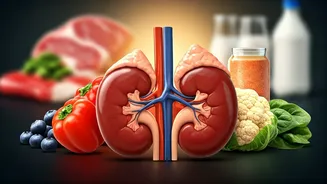Kidneys: Filtration Heroes
The kidneys are indispensable organs, diligently filtering waste and toxins from the blood. They play a pivotal role in maintaining the body's fluid balance
and regulating blood pressure. Proper kidney function is critical for overall health, and dietary choices significantly influence their performance. The kidneys filter about half a cup of blood every minute, processing roughly 120-150 quarts of blood daily to produce about 1-2 quarts of urine. When kidneys aren't functioning properly, waste and excess fluids can build up in the body, which can lead to various health complications. Therefore, incorporating kidney-friendly foods into your diet can help support and maintain their functionality.
Embrace: Foods to Eat
Certain foods provide substantial benefits to kidney health. Firstly, **cauliflower** is rich in vitamin C, vitamin K, and folate, all essential for overall health. The nutrients within cauliflower help to neutralize the free radicals. The second food to embrace is **blueberries**, which are packed with antioxidants, known to help protect against cellular damage. They are also low in sodium, phosphorus, and potassium, making them a safe choice. **Fish** rich in omega-3 fatty acids, like salmon, can reduce inflammation and support kidney function. Fatty fish may also offer protection against certain types of kidney disease. Lastly, **apples** are a good source of fiber and have anti-inflammatory properties, making them a good choice for kidney health.
Avoid: Foods to Limit
Conversely, some foods can be detrimental to kidney health. Foods **high in sodium** should be avoided as they can increase blood pressure, which strains the kidneys. Processed foods, canned soups, and fast foods are particularly high in sodium. **Processed meats**, such as bacon and sausages, often contain high levels of sodium, phosphates, and preservatives. High phosphate intake can put a strain on the kidneys. Foods **high in potassium**, such as bananas, potatoes, and spinach, should be limited if you have kidney problems, because the kidneys may struggle to remove excess potassium from the body. Finally, **soda** should be minimized. Dark-colored sodas, in particular, often contain phosphorus, which can harm the kidneys.
Dietary Strategies Explained
Implementing these dietary guidelines effectively involves a comprehensive approach. It's crucial to consult with a healthcare professional or a registered dietitian, especially if you have pre-existing kidney issues. They can provide personalized advice based on your specific health condition. Focus on meal planning and preparation to control your intake of sodium, potassium, and phosphorus. Reading food labels carefully can also help you make informed decisions. Aim to consume fresh, whole foods whenever possible. Moreover, stay well-hydrated by drinking plenty of water throughout the day. Water supports kidney function by helping them filter waste. Consuming these foods is just one aspect. Regular medical check-ups and a balanced lifestyle are vital to maintaining optimal kidney health.





















